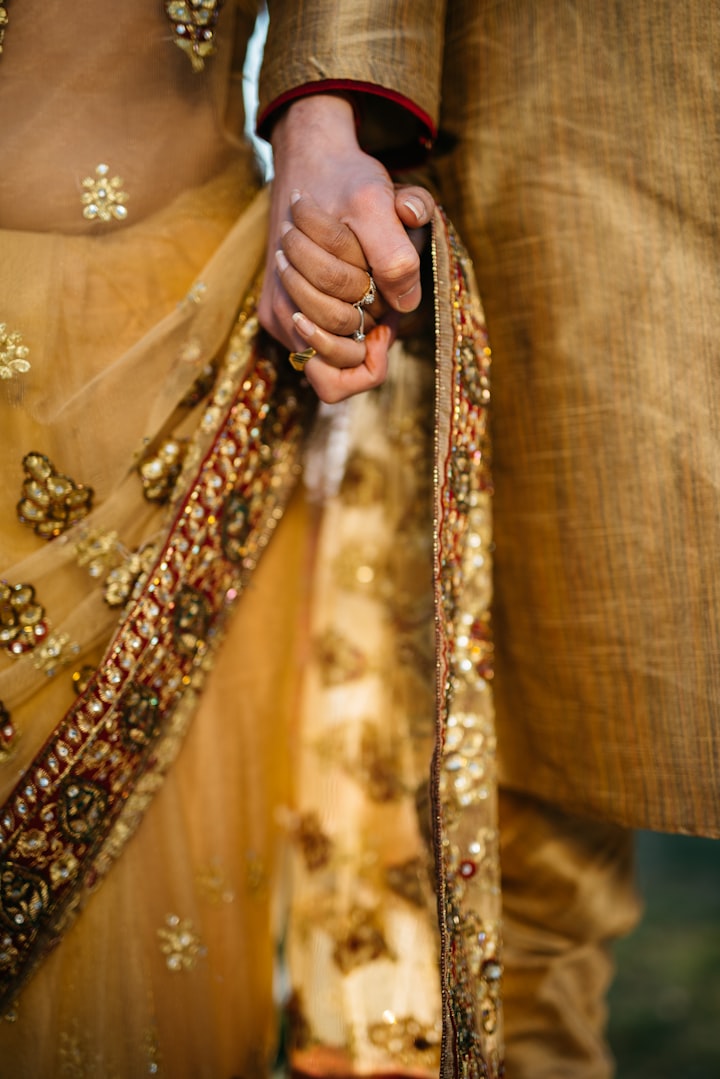I Married into a Foreign Culture
They called us enemies

I was on my way to find a gift for my daughter's birthday when my motorbike hit a hill of construction dirt. The accident sent me hurtling barelegged into the merciless jaws of the pavement. In a daze, I looked up from the street and saw a brown-colored angel standing over me. She offered a hand. The hand was that of Tuti, a lovely Javanese woman I had recently met online while living overseas.
I was happy that, in the short time she'd known me, she had recognized me offline and decided that I was worth rescuing. After I asked Tuti for her cell number. Should I call her? What did I want? But was anyone ready for me?
I had two failed marriages. A list of physical problems. History of rootlessness, and a questionable ability to handle a motorbike. I felt like a teenage old man but can't older people have new relationships too?
I dreamed of my collaborator and the life to celebrate together.
I held, in my mind, the image of Tuti. At that time, she wore her jet black hair in a braid. I admired the flawless bone structure of her face. The noble edges on her nose and cheeks indicated, to me, a knowledgeable and thoughtful person. My memory traced the high, v-shaped slant to her eyebrows. Her eyes shone darker than burnt coals; a place where my reflection might enter and never be seen again. I appreciated the natural color of her rich brown skin.
In contrast to the lily-white Scandinavian women who baked themselves on the beach. The attraction, though, was more than skin deep. I dreamed of having this intriguing woman in my life. Tuti came over from eastern Jawa. She spoke Indonesian, Javanese, and 10 words of English. I spoke less than 10 words in Indonesian, English, and a dialect from the Upper American Midwest. I thought if for no other reason the language alone made this relationship a long shot.
I picked up the phone and told her my name. Our numbers game evolved: one word, one phrase, one Google-translated sentence at a time. We played Q and A on the keyboard. She asked me about my daughter, and how my parents had died a day apart from each other. I asked how her Muslim family would feel about hanging out with me. At one point I typed in my name and asked her to list three things that she didn't like about me. She typed, "Suka," meaning all good. (She was getting to know me.)
When we met, Tuti worked at a motorbike repair shop in Ubud, Bali. Unlike Muslim women. Balinese women have daily religious duties at the temple. And those duties could interfere with work outside the home. Thus most of the women clerks come from Jawa.
Tuti was the first Javanese woman I met. As such, there was a lot I didn't understand about her world. I was grasping the complexities of Balinese Hinduism. Now I was on a crash course to understand Javanese Islam. She was caring, humble, and malu (shy) in public. She felt self-conscious about not meeting the standards of western dress.
The first time I took her to a restaurant she froze at the door. Thinking that her hair, makeup, and attire weren't up to fashion code. I thought she looked perfect. When the menu came, she ordered the least expensive item listed. Then she turned the dinner table on me when I tried to order in her language. She cringed with embarrassment at my attempt to order a smoothie.
Working through the challenges of communication, I suggested we try sports. Sports didn't need words. She had worked 10 years as a caddy on a top PGA-level course, where she learned golf from the pros. I soon learned that she could drive a ball over a volcano. When we played billiards, she wiped the table clean. Badminton sent me tripping over my feet while trying to return a volley.
The agony of defeat needed no translation.
Tuti had never heard of Wall Street. The Occupy Movement, women's liberation, feminism, or the MeToo movement. Didn't know about the Woodstock Music Festival or 9/11. She knew little about the United States, except for a few pop stars and the name of the President.
I didn't care that she couldn't read my biography and understand where I came from. In time, I believed, we would come to understand and embrace each other's worlds. At least, we both showed an eagerness to try. One day, Tuti accepted an invitation to my villa.
After admiring the garden, she crossed the threshold. I watched her look around and assess the general untidiness of the place. Her facial expression told me that my neat-freak days were a matter of opinion. I didn't know if the timing was right, but I took a brave gulp of air and invited her to stay. I promised to clean up my act. She reacted to my question with an affectionate smile of "yes." And in my imagination, we kissed, fumbling, for the first time. Our lips met, a bit crooked and unsure, experimenting, searching, longing, and dreaming. It was a hard kiss, too; one refusing to let go, bonded by magnetism.
Tuti moved out of her tiny, beat-up, rental room and moved in with her one suitcase full of shoes. The next day, she volunteered to do the domestic chores, which left me free to write and to fight my demons? My travel clothes were washed, ironed, and folded or hung. I had forgotten the comforting smell of a steaming iron on clean clothes. It took me back to childhood when I would sit for hours by my mom while she pressed through a week of laundry. Each part of the day became a song of Tuti's routine.
In the morning, before I could rub the dream sand from my eyes, she put a cup of hot coffee in my hand. Before I could take a sip, she was sweeping under my feet. When I became absorbed in the computer, she would tap my shoulder for lunch. Tuti shopped for groceries and filled the kitchen with tantalizing aromas. Which led me to a healthy weight gain.
Her favorite TV show was Master Chef, and if I blocked her view she would pull me onto the couch to watch with her. I had to put the brakes on the chocolate cake.
She fretted over me, almost like a mother. Cutting my hair. clipping my nails, and making sure I looked flawless before going out in public. I felt embarrassed for myself. For too long, I had no one in my life who gave a rip about my needs or feelings. Now I was being treated like a prince and rendered helpless.
She seemed to enjoy the activities and roles she had taken on. I did not want her to be a servant, but I wanted her to be happy. I knew that she cared about people. While watching a TV show about a celebrity in Jakarta who helps the poor. She would watch with a tissue in hand, holding back her tears.
Tuti ended up taking charge of housekeeping for my guest house, as well. I had been maintaining it, but she kept it in better shape. In return, I shared earnings from the guest house, and she was able to quit her job in town. Once when she sat off by herself, I thought she was tired or bored. She held up her cell phone to reveal her "addiction" to Sudoku, and puzzle-solving. It took me back to our numbers game.
Tuti was 36 and I was 59. Going forward, though, the age gap didn't matter. We had already figured out that age wasn't as important as language. We were living happily together while booking up my guest house and our vocabulary.
Then, I broke down and wanted to end this story. I admitted to myself that I was falling in love with her.
She was clueless about my feelings, I thought. Tuti wasn't a practicing Muslim. But her family was and frowned that we were living together for over a year out of wedlock. Tuti's parents had passed away and I found myself getting a serious marriage sales pitch by her Uncle. I didn't have an excuse for not marrying her. Except I felt uncertain about my future. And couldn't speak the language or understood Islam. It was a big, scary step into another unknown but not any different than the unknown step I took when I moved to Bali.
I concluded, why not.
On our auspicious wedding day, I woke up in Tuti's rickety bed in what used to be her bedroom at Uncle Matt's. The pink cement walls showed their age by the length of cracks from floor to ceiling. A century-old, black-and-white photo hung sideways above the door. The one low-watt ceiling light cast a pale twilight across the room. Tuti spent little time there. Her only clothes cabinet stuffed with moldy-smelling shoes.
Before she met me, Tuti had dated a Swedish tobacco salesman for seven years and lived in nice hotels.
The house vibrated with a dozen women, young and old. Wearing traditional Javanese headscarves (hijab). The women sat in a circle on the kitchen floor. They chopped chicken and vegetables into assembled gift-wrapped boxes of food. Others cleared furniture and rugs from the living room. Space for our wedding ceremony.
By the time I drank my first cup of coffee, Tuti was off to a salon appointment. During the early hours, my only morning task was to bathe - with a bucket of cold water.
I took a stroll through Tuti's village. I tiptoed down a busted-up pathway of chicken poop, and out to the main road. I avoided, as much as possible, the creek of raw sewage that crisscrossed my path. To my surprise, I did not see any wild dogs as seen in Bali. Here, feral cats seemed to rule, and keep down the rat population?
In stark contrast to the lush botanical garden of Ubud. The village is made up of small, houses, side by side called a kampung. Flower pots. Colors of red, blue, pink, and green, helped to brighten up the weather-beaten buildings. Terraces and front yards with laundry lines opened to the neighborhood.
I felt welcomed here.
Having fun, children snapping the ceremonial pecut whip. Some greeted me in English: "Gerd m-o-o-ning, Miztrrr." Women held their babies out to me, smiled, and blushed.
I can only begin to imagine what they thought. Who was this stranger, and why was he here? For the first time, a white man came out of their TV set and stood in their village. I got a rock star treatment that I never took for granted. The thought of getting married again did not weigh on my mind. I was too overwhelmed trying to absorb what was happening.
When I turned a corner to circle the village, I ran into a pengamen. This is a type of street performer, like the street guitar players who sing at taxi windows. Here, the entertainer goes door to door, hoping for a donation. This young man dressed in drag, singing with a portable karaoke machine in his hand. How, I questioned, did that person fit into this Muslim culture?
I didn't need a watch to know when I needed to head back. Each day is divided into five prayer times. The ubiquitous mosque speakers remind everyone of the time to wake up, eat and break for prayer. I got the message, loud and clear. My knowledge about Islam was none. All I knew was Indonesia was the largest Muslim nation in the world with 90% of the population being Islam. Most Muslims are either of two denominations: Sunni or Shia. The overwhelming majority in Indonesia adheres to Sunni Islam. I have no idea what that means. I can't read or write Arabic and am unfamiliar with the Koran.
My wedding was in Javanese, Islam. A unique, ancient cultural tradition. Filled with beautiful ceremonies, music, art, folklore, magic, and mysticism.
These people hated radical Islam terrorists more than Americans. There are Islamic extremists like there is Christian extremist. I can share after the many years I lived in the heart of this Islam. The xenophobic hatred promoted against Muslims in America is bogus. My sister looked at me in fear that I converted to Islam. In some people's minds, I married the "enemy,"
Hour by hour, Uncle Matt's house filled with family and relatives. They had only one new name to remember: mine. I could not remember or pronounce theirs. I greeted them in the best way I knew how. They arrived in their best sarongs, peci hats, and colored hijabs. Each smiled and gave a slight bow, then took their place on the living room floor.
Tuti wanted to forego the groom's traditional "Aladdin-looking" attire. Instead, she asked Uncle Matt to outfit me in one of his business suits.
Had I known, I would have bought an affordable new, odor-free suit that fit. Instead, I squeezed into a jacket and pants that smelled like Tuti's musty old shoes.
Uncle Matt sprinkled me with cologne, which did not enhance my scent. I did have a pair of new black shoes and socks, and a gold-colored tie. I wore a traditional Muslim hat, edged with golden leaves.
When I looked in the mirror, I saw a new me. Not a sorrowful man defined by his relationship failures. I straightened my tie and hat, and said to my reflection, "You're a lucky man."
Mr. (Pak) Modin, the elderly holy man arrived. He greeted me and asked me to recite my vow. When I said it, he shook his head. I memorized the wrong vow, so he wrote a new version.
Tuti's English-speaking cousin said, "You have a few minutes to get the new one right. Or recite it in front of everyone until you do." I practiced: Saya berjanji, dalam kejujuran dan ketulusan, menjadi bagi anda suami yang setia dan membantu. Roughly translated: "I, Arlo, take you, Tuti, to be my lawful wedded wife."
The mix-up occurred because of wedding vows. Ceremonies and rituals vary from region to region. Somehow I memorized a vow not customary in this area.
At 4 p.m., Tuti - in a white, lacy wedding gown called the kebaya - made her gala entrance into the living room. We sat before Pak Modin, and in the presence of her admiring family. Lacking a wedding rehearsal, I must have looked like Mr. Bean goes to the Mosque. I misplaced the ring. Handed the dowry at the wrong moment, and, to the delight and amusement of her family, reversed our roles. Everyone laughed. After my first attempt to recite the new vow, Pak Modin smiled in approval. Tuti's older brother, Kamid, stood in for the ceremonial role of her father. When her turn came, Tuti glowed like a goddess (widodari ) and recited her vow.
We could now share Tuti's old bedroom without shaming the family. The ceremony was followed by a prayer and a reception line. I touched each person's hands to my forehead in honor of the almighty, Mohammad.
We then relaxed into the reception. Tuti's family sat on the floor, passed rice, made small talk, and shared gifts. I bought ice cream for all the children in the village. Cranked up an old karaoke machine, and passed out modest gifts of money throughout the clan.
We hired a photographer, who turned the living room into a photo studio. First, he took formal photos of the kids, brothers, cousins, uncles, and aunts. The sessions lasted for hours. They were eager to pose because it was the first time they had taken photographs. I am thrilled for Tuti that her family gathered for this occasion.
The women (of course) cleaned up. The men went outside to play cards - until 6 a.m. About 3 a.m. I spotted Uncle Matt 100,000 rupiah so he could stay in the game.
I framed my favorite photo of Tuti and me. For our honeymoon, we returned to Bali. Ordered pizza delivery, and snuggled up to our favorite dangdut singing contest on TV.
Our marriage is not legally recognized in the United States. If we ever decided to live in America, I would have to file a marriage petition for Tuti through US immigration. I do not know whether we will marry yet a third time.
Over years, during our marriage, Tuti took good care of me. We got better at each other's language. I want to point out that in my two first marriages we spoke English. That is still no guarantee you will understand each other! After moving around Indonesia we finally settled in her family's village.
Read the book!
About the Creator
Arlo Hennings
Author 2 non-fiction books, music publisher, expat, father, cultural ambassador, PhD, MFA (Creative Writing), B.A.






Comments
There are no comments for this story
Be the first to respond and start the conversation.